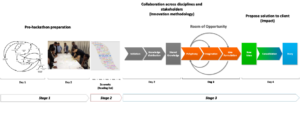In this course, PhD candidates gain theoretical as well as practical experience in methods and ways to solve complex problems that are characteristic for sustainable development challenges. The course works with both, private and public sector institutions (problem owners; possibly varying from one course to the next) who furnish PhD candidates with an applied context and specific sustainable development problems.
PhD candidates receive practical guidance as well as input on theory, methods and techniques in systems thinking and creative problem solving. They apply this knowledge in interdisciplinary groups to explore, generate new thinking and develop solutions for these problems.
Creative problem solving provides an experimental and iterative approach to idea development and the creation of new products and services. Systems thinking helps address the challenge of how to support innovations to enter and actively shape the systems that surround complex sustainable development problems. Taken together, systems and creative problem solving form an integrated and novel basis for achieving the course objectives.
The main activities of the course are organized in the form of a hackathon, that is, a problem solving event where the PhD candidates collaborate over a period of three days to learn and apply early stage design concepts such as empathize, define, ideate, prototype and test. Overall, the course consists of three stages that are illustrated in Figure 1.
- Stage 1 – Understanding the problem: Research including workshops with problem owners to drive understanding of the problem to be solved. Problem understanding involves appreciating factors such as power dynamics, competing incentives and cultural norms, and comprehensively mapping the system that should be changed.
- Stage 2 – Literature study
- Stage 3 – Creating and preparing for impact (hackathon day 1-3)

Figure 1: The course consists of 3 stages: 1) understanding a problem, 2) Literature study, and 3) Creating and preparing for impact (Modified from Ness, 2018; Kopainsky et al. 2017; Stave et al. 2017; by Hiwa Målen)
Ness, I.J. (2018): Researching creativity in multidisciplinary groups working with developing innovative ideas. In Handbook of Re/Searching the Social in Creativity Research: Methods, Studies, and Reflections’. Palgrave Macmillan book series ‘Creativity and Culture’.
Kopainsky B., Ledermann S.T., Tribaldos T. 2017. A food systems perspective for food and nutrition security beyond the post-2015 development agenda. Systems Research and Behavioral Science. DOI 10.1002/sres.2458.
Stave K., Kopainsky B., Anteneh M. , Ameha Mengistu A., Yibeltal Sebhat M., Aynalem S., Tefera B., Wassie A., Aragaw C., Getnet B., Beyene B.S., Abebe A., Goshu G., Tilahun Tadesse A., Mesfin Ayenew M. 2017. Participatory system dynamics mapping for collaboration and socioecological integration in the Lake Tana region. In: Stave K., Yemer G.G., Aynalem S. (eds.). Social and Ecological System Dynamics. Characteristics, Trends, and Integration in the Lake Tana Basin, Ethiopia. Springer, New York et al. Chapter 34: 615-630. ISBN 978-3-319-45753-6. DOI 10.1007/978-3-319-45755-0.
